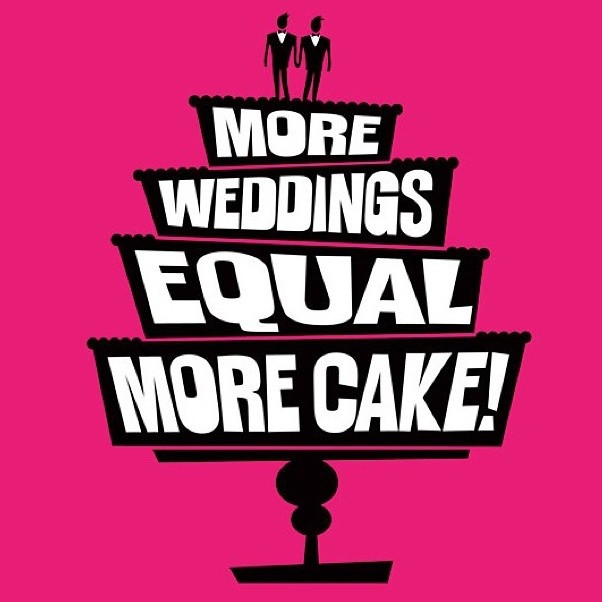The referendum on marriage equality will take place next month, on May 22nd, but what does it really mean for you? Dr Lorraine Mancey O'Brien is CEO of f the equality based marriage organisation Marry Me Ireland. She's also a lecturer in gender, development and education at UCD and Director of the Irish Institute of Celebrants. She shares her views on marriage equality with sandpweddings.ie.
I was in a taxi the other day, on a cold and rainy Monday, when something came on the radio about the referendum in May on equal marriage rights, or gay marriage as we sometimes say. The taxi driver said "I've a son..." (and at this point the conversation could have gone one of two ways) "...who is straight," he said, "and a son who is gay, why should one of my children be allowed to marry and be happy and the other one cannot?" I sympathised with the man over this situation and thought how simple it was when it was put like that.
I love weddings; I spend a huge percentage of my time marrying people, providing them with ceremonies and celebrations all across Ireland. But why should one person be able to say the words 'I do' and not another? Weddings are booming again in popularity, they show no signs of ever going out of fashion, but the fact is, because of the gender of the person you fall in love with, some of it is currently denied to you. In my professional experience all couples want to walk down the aisle, the story of their meeting told, vows exchanged, meaningful words spoken that cements their union, their specific bond, personalities and they want to do this in front of their family and friends. I think it's just wonderful. So I want to look at some of the misinformation that is around at the moment, and let you make up your mind as to whether you feel the referendum and equality is something worth voting for.
There is an argument put forward that 'gay marriage' has never existed in any society until recently and that heterosexual marriage has always existed for thousands of years unchanged. However, I know this not to be true, because when I am not conducting ceremonies for people, I am a lecturer in anthropology in UCD and my academic research disputes all of this. Gay marriage, in one form or another, has existed for thousands of years in multiple cultures. In Africa alone, research shows that there are at least 42 cultures with documented gay or lesbian marriage or commitment ceremonies. For example, in the case of woman-woman marriage among the Nuer (and some other African groups), a barren woman can divorce her husband and take another woman as her wife. Among some Native American groups, males who preferred to live as women (berdache) adopt the names and clothing of women and often became wives of other men. Until recently, most cultures were polygamous, rather than monogamous, where the ideal was for one man to marry two or more wives if he could afford it. In some cultures and religious groups, group marriage exists. In two cultures in the world, the Nayar of India and the Na of China, there is no marriage at all. The world is wonderfully diverse and so is marriage.
Now, let's take a look at the argument that says 'gay marriage' will lead to the destruction of society. We need only to look at countries that have already legalised same sex marriage to see that the fabric of society did not fall apart. Places that now have same-sex marriage (UK, France, New Zealand, Belgium, Spain, Canada, South Africa, Norway, Portugal, Iceland, Argentina, Denmark, Uruguay) have continued on as before, enhanced by an extension of essential rights and freedoms.
"What about the children?" is often what we hear from the opposing side. The argument made is that children raised by gay or lesbian parents are disadvantaged or harmed in their development. However, again, overwhelming research shows that when the children of gay and lesbian parents are compared with the children of heterosexual parents, they are in no way disadvantaged, nor do they exhibit any difference in their psychosocial development. In some cases, research has found that it is in fact the very opposite - children of same sex couples outperform children from heterosexual couples in terms of stability, emotional progression and academic achievement with a wider understanding and connection to society.
How about the argument that gay marriage threatens religious freedom? The view that Christianity has always been opposed to gay marriage is also not true. Historical research shows us that in early Greek Christianity, same-sex commitment ceremonies were celebrated. In fact, two Christian saints, Saint Sergius and Saint Bacchus, who were openly gay, had a same-sex commitment ceremony together in A.D. 303.
So, I can tell you that the results of more than a century of academic research on relationships and families, across cultures and through time, provide no support whatsoever for the view that civilisation and society depend upon marriage as an exclusively heterosexual institution. Personally I don't like the term 'gay marriage' - I think all unions are marriage and we don't have straight marriages so why should we have gay ones, but this may just be semantics - I will be voting for 'gay marriage' in the referendum on May 22nd and I implore you to do the same. This is your moment to contribute to the culture of Ireland, to make history and to embrace the global traditions of cultural acceptance.
- Dr Lorraine Mancey O'Brien of Marry Me Ireland


